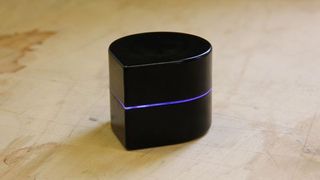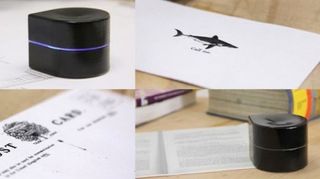Not your mama's boxy tabletop inkjet: Meet the ZUtA Pocket Printer
Bringing portable printers into the mobile age

For all the advancements we have made in tech - like smartphones, smart cars and smartwatches - we still need to print things.
Cue the GIF of Michael from Office Space, "PC Load Letter - what the f*** does that mean?" Hell, you may have smacked a printer or two in your day, too.
But the guys behind ZUtA Labs, an Israeli team that has developed the Mini Mobile Robotic Printer, wants do away with the typical boxy tabletop inkjet.
"I found myself working everywhere on the go, and every once in a while, I had to print something. But every time I had to print, I had to wait to go home or to the office," ZUtA Labs co-founder Tuvia Elbaum told TechRadar. "That's when I thought, 'How can I make the printer small?'"
Instead of using the old-fashioned paper feed, which hold the reservoirs of ink and toner needed to power them, ZUtA got rid of the bulky printer, put the cartridge on a set of small wheels and let it run across a piece of paper by itself. The printer is designed to roll itself over the paper, instead of having to ingest pages to spit ink onto them. Think of it like a printer robot.
Who said print is dead?
Elbaum and and fellow Co-Founder Matan Caspi conceived their first prototype with a remote control car in 2013 while they were enrolled at the Jerusalem College of Technology. The design has since become more refined.
"The robot itself is like the guts," said Elbaum. He added, " A printer doesn't actually need to be any bigger than your hand. As long as it can trail ink from left to right across a page, a printer can be as small as you want to be."
Get daily insight, inspiration and deals in your inbox
Get the hottest deals available in your inbox plus news, reviews, opinion, analysis and more from the TechRadar team.
Here's how the Pocket Printer works: To print out a document, a user aligns the device at the upper-left corner of a piece of paper (any size page you like). The Roomba-like device receives the data via a wireless Bluetooth connection, then wheels its inkjet across the piece of paper and squirts grayscale ink wherever a document tells it to, using a sensor to track its motion.
Since the battery-powered printer doesn't require any special drivers, it connects directly to smartphones, computers and tablets, either by using the traditional print function or through its app.
The printer, which was inspired by personal necessity, is meant for smaller documents, such as tickets or notes from a meeting, but for larger projects with multiple pages, it will wait for you to simply pick up the device and place it on a fresh piece of paper when you need to. Unfortunately, it only prints 1.2 pages per minute. Still, for being slow on the clock, it's portability and ease of use should make up for any lost time.
The printer landscape is littered with smaller models, like the Brother PocketJet, but at 10-inches long by 2-inches deep and weighing a pound, it's a giant compared to the Pocket Printer. And other printing devices that are advertised as portable are limited to the size of the paper they use, "because the paper has to actually go through," said Elbaum. Additionally, smaller printers are constrained to wall sockets and you can't take it out and about with you.

After a successful Kickstarter campaign wrapped up in May, ZUtA Labs' main focus is now on completing a final working prototype with higher quality output.
The first version of the Pocket Printer will only print in black and white, with color and more capabilities in future incarnations.
The founders say the final version of the printer will be cut down in size by roughly a third, aiming to measure less than 4-inches high, around 4.5 inches in diameter and weigh a little more than half a pound. It will be tear drop-shaped, untethered, offer one hour of full usage on a single charge (charging via USB), and able to churn out an A4 page of grayscale text or images in 45 seconds.
Elbaum said he plans to print on more materials other than paper. Think wood, cloth or any material you can get your hands on. The device is expected to go to production in September and be shipped to Kickstarter backers in January 2015, retailing for about $240.
Jessica Naziri is a tech expert, online media personality and accomplished journalist covering the intersection between technology and culture. She is a self-proclaimed "chic geek," who turned her passion into a career, working as an technology reporter. You can follow her on Twitter @jessicanaziri or email her: iamjessicanaziri@gmail.com.
Most Popular
